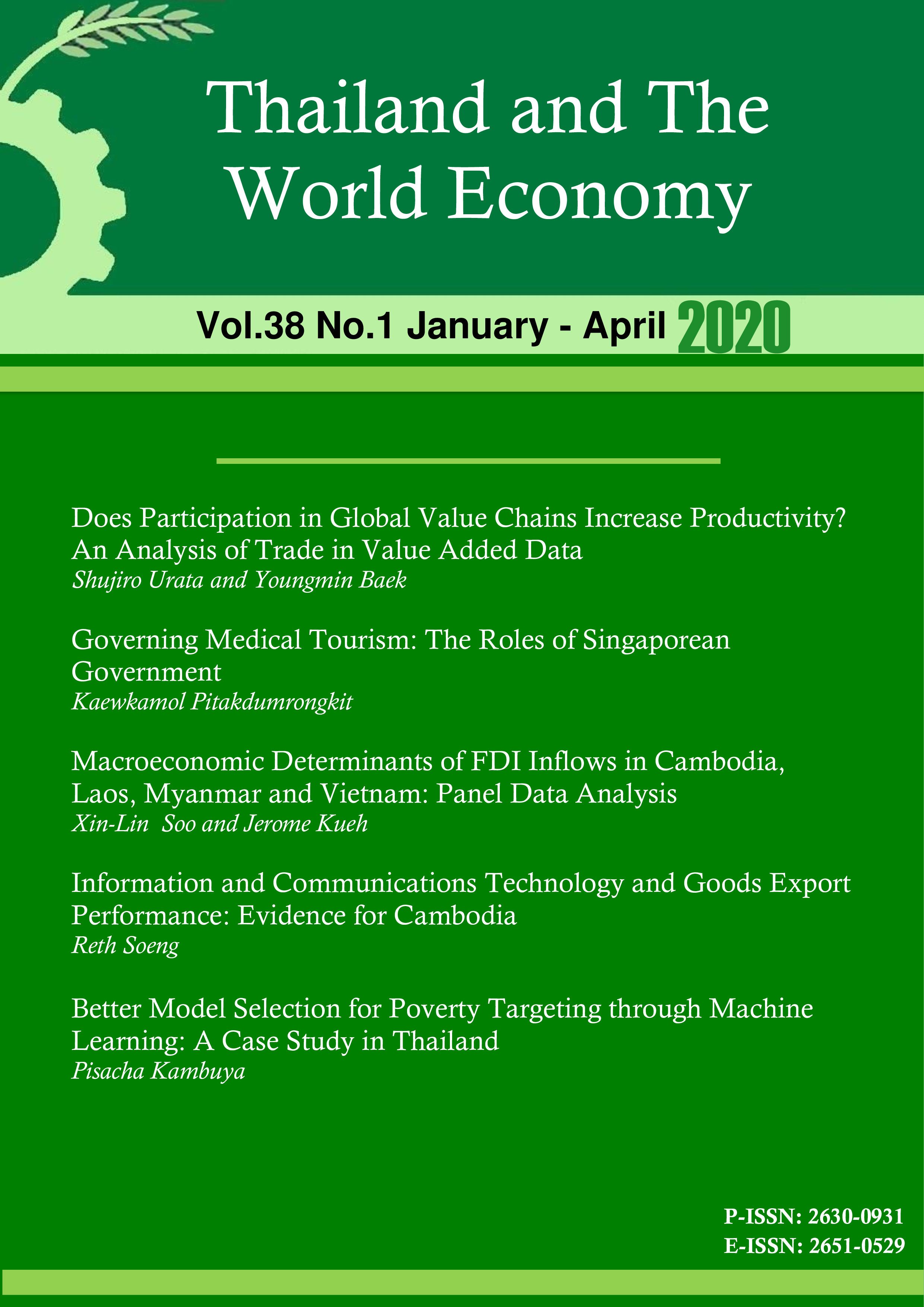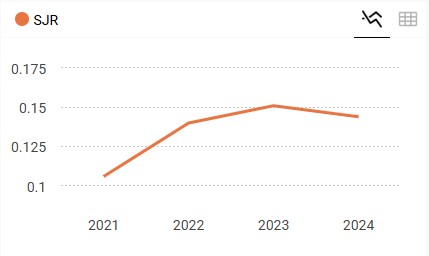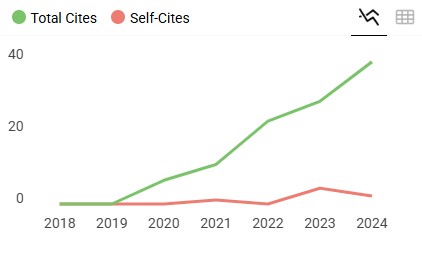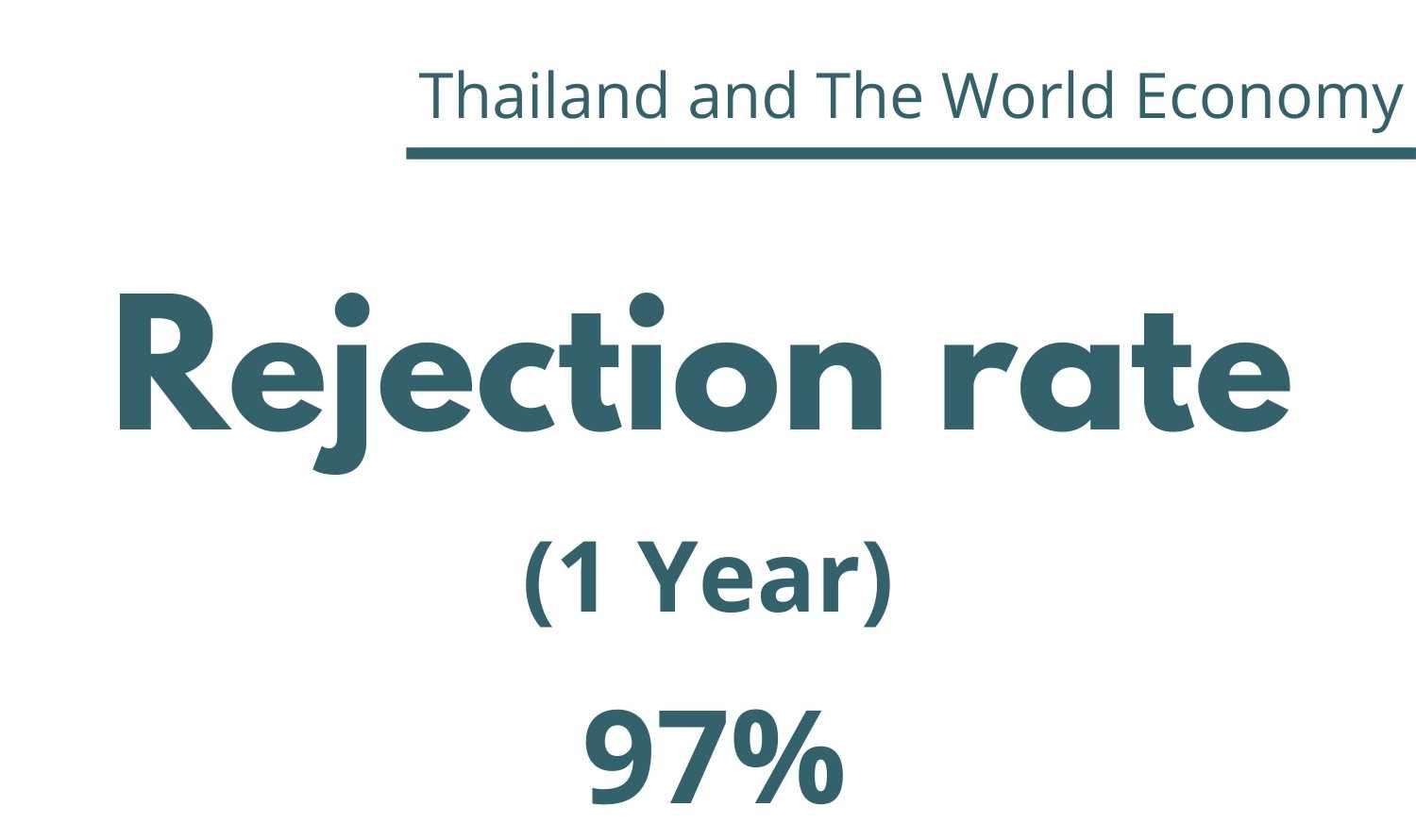Information and Communications Technology and Goods Export Performance: Evidence for Cambodia
Keywords:
Cambodia, ICT, Export Performance, Panel DataAbstract
This paper empirically examines the impact of ICT on Cambodia’s goods export performance. ICT proxied by broadband, mobile phone and fixed phone penetrations, as well as the Internet use is introduced into the augmented gravity model with a panel data set from 1996 to 2017. Due to high multicollinearity among the included variables, each ICT variable is introduced into the model one by one. Estimation is carried out using the Hausman-Taylor method, which reduces or removes the correlation between the composite error terms and the included variables. ICT variables are found to be positively associated with Cambodia’s goods exports. Based on the results, the Royal Government should give a high priority to further develop ICT infrastructure and continue to promote ICT uses in enhancing the competitiveness of Cambodia. Implications from this study, in particular the important roles of ICT in enhancing export performance, are of vital relevance to other developing countries, including Thailand where ICT infrastructure development and uses still need to be further enhanced and promoted to reap the full benefits of ICT in the age of an increasingly digitalizing world.
References
Autor, D.H., Katz, L.F. & Krueger, A.B (1998). Computing Inequality: Have Computers Changed the Labor Market? Quarterly Journal of Economics, 113 (4), 1169-1213.
Autor, D.H., Levy, F., & Murnane, R.J. (2003). The Skill Content of Recent Technological Change: An Empirical Exploration. Quarterly Journal of Economics, 118 (4), 1279-1333.
Barbero, J. & Rodriguez-Crespo, E. (2018). The Effect of Broadband on European Union Trade: A Regional Spatial Approach. World Economy, 41 (11), 2895-2913.
Choi, C. & Yi, M.H. (2009). The effect of the Internet on economic growth: Evidence from cross-country panel data. Economics Letters, 105(1), 39-41.
Choi, C. (2010). The effect of the Internet on services trade. Economics Letters, 109(2), 102-104.
Clarke, G.R. & Wallsten, S.J. (2006). Has the Internet increased trade? Developed and developing country evidence. Economic Enquiry, 44(3), 465-484.
Cuyvers, L., Soeng, R., Plasmans, J. & Van Den Bulcke, D. (2011). Determinants of Foreign Direct Investment in Cambodia. Journal of Asian Economics, 22(3), 222-234.
de Jong, E. & Bogmans, C. (2011). Does corruption Discourage International Trade? European Journal of Political Economy, 27(2), 385-398.
Fernandes, A. M., Mattoo, A., Nguyen, H., & Schilffbauer, M. (2019). The Internet and Chinese exports in the pre-alibaba era. Journal of Development Economics, 138(c), 57-76.
Freund, C. & Weinhold, D. (2002). The Internet and International Trade in Services. American Economic Review, 92(2), 236-240
Freund, C. & Weinhold, D. (2004), The Effect of the Internet on International Trade. Journal of International Economics, 62(1), 171-189.
Greene, W. H. (2012). Econometric Analysis. Upper Saddle River: Prentice Hall.
Hausman, J. A. (1978). Specification Tests in Econometrics. Econometrica, 46(6), 1251-1271.
Hausman, J. A., & Taylor, W. E. (1981). Panel Data and Unobservable Individual Effects. Econometrica: Journal of the Econometric Society, 49(6), 1377-1398.
Hsiao, C. (2005). Why Panel Data? Singapore Economic Review, 50(2), 143-154.
Hsiao, C. (2007). Panel Data: Advantages and Challenges, TEST, 16(1), 1-22.
Lin, F. (2015). Estimating the Effect of the Internet on International Trade. Journal of International Trade and Economic Development, 24(3), 409-428.
Liu, L. & Nath, H.K. (2013). Information and communications technology and trade in emerging market economies. Emerging Markets Finance and Trade, 49(6), 67-87.
McPherson, M. Q. & Trumbull, W. N. (2008). Rescuing Observed Fixed Effects: Using the Hausman-Taylor Method for Out-of-Sample Trade Projections. International Trade Journal, XXII(3), 315-340.
MPTC (2018, 2019). MPTC Monthly Report. Phnom Penh: Telecommunications Regulator of Cambodia.
Phong, K., Srou, L. & Solá, J. (2016). Mobile Phones and Internet Use in Cambodia 2016. Phnom Penh: Emerald Group.
Plasmans, J. (2006). Modern Linear and Nonlinear Econometrics. New York: Springer Verlag.
Rahayu, R. & Day, J. (2017). E-commerce adoption by SMEs in developing countries: evidence from Indonesia. Eurasian Business Review, 7(1), 25-41.
Royal Government of Cambodia (2014). Cambodia’s National Strategic Development Plan 2014-2018. Phnom Penh: Ministry of Planning.
Royal Government of Cambodia (2016). Sub-Decree on Implementation of Telecommunications and ICT Development Policy 2020. Phnom Penh: Office of the Council of Ministers.
Royal Government of Cambodia (2018). Rectangular Strategy Phase IV. Phnom Penh: Royal Government of Cambodia.
Stiroh, K.J. (2002). Information Technology and the U.S. Productivity Revival: What Do the Industry Data Say? American Economic Review, 92(5), 1559-1576.
Soeng, R. & Cuyvers, L. (2018). Domestic institutions and export performance: Evidence for Cambodia. Journal of International Trade and Economic Development, 27(4), 389-408.
Soeng, R., Cuyvers, L. & Soeung, M. (2019). E-commerce Development and Internet Banking Adoption in Cambodia, in Chen, L. and Kimura, F. (eds.): Developing the Digital Economy in ASEAN. United Kingdom: Routledge.
Studenmund, A. H. (2017). Using Econometrics: A Practical Guide. Boston: Pearson
Tang, L. (2006). Communication Costs and Trade of Differentiated Goods. Review of International Economics, 14(1), 54-68.
United Nations Conference on Trade and Development (2017). Cambodia: Rapid e-Trade Readiness Assessment. Geneva: United Nations.
Vemuri, V.K. & Siddiqi, S. (2009), Impact of commercialization of the Internet on international trade: a panel study using the extended gravity model. International Trade Journal, 23(4), 458-484.
Vong, S., Lee, D. H. & Zo, H. (2012). Cambodia Mobile Telecommunication Market: Opportunities and Challenges, Proceedings of the 19th ITS Biennial Conference 2012, Bangkok, Thailand.
Wooldridge, J. M. (2010). Econometric Analysis of Cross Section and Panel Data. Cambridge: MIT Press.
Wong, K-Y (2019), E-commerce and International Trade, in Chen, L. and Kimura, F. (eds.): Developing the Digital Economy in ASEAN. United Kingdom: Routledge.
World Bank (2018; 2019). World Development Indicators. Washington, DC: World Bank.
Xing, Z. (2018). The Impacts of Information and Communications Technology (ICT) and E-commerce on Bilateral Trade. International Economics and Economic Policy, 15(3), 565-586.
Yushkova, E. (2014). Impact of ICT on trade in different technology groups: analysis and implications. International Economics and Economic Policy, 11, (1-2), 165-177.










